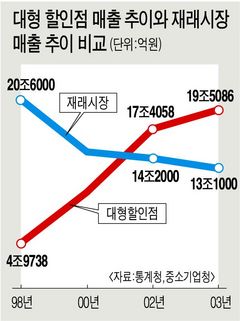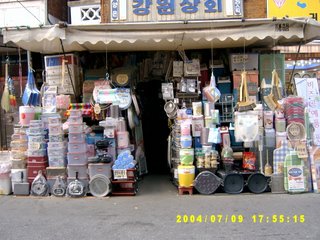(Small businesses) Marketplaces, disappearing or holding on
Both Chosun Ilbo and Ohmynews have had something on marketplaces. The Korean term is usually "traditional market" (chaerae sijang), but there isn't actually any concept of "modern" marketplace. (Now that I think, this is the only context I ever see the word chaerae (在來). And also, checking the dictionary, the word also has the meaning of "ordinary, common".) Chosun, with a headline "Marketplaces, on the verge of death" has also some numbers to back up the message: the registered number of marketplaces in early 90s was 3500, but at the moment 1608. Combined sales in 1998 were 20 trillion won [20조, 13 billion €, right?], but in 2003 only 13 trillion [8.6 billion €]. The main reason for the downfall is mainly in the change of distribution structure; the large discount stores (how are they defined) are gaining ground continuously. "Old and unsanitary buildings, cramped and inconvenient spaces with lacking parking space, aged shopkeepers who lack energy to accommodate" are the reasons one quoted consultant gives. Chosun, with a headline "Marketplaces, on the verge of death" has also some numbers to back up the message: the registered number of marketplaces in early 90s was 3500, but at the moment 1608. Combined sales in 1998 were 20 trillion won [20조, 13 billion €, right?], but in 2003 only 13 trillion [8.6 billion €]. The main reason for the downfall is mainly in the change of distribution structure; the large discount stores (how are they defined) are gaining ground continuously. "Old and unsanitary buildings, cramped and inconvenient spaces with lacking parking space, aged shopkeepers who lack energy to accommodate" are the reasons one quoted consultant gives. This time it's not about bad economy - or bad economic policy... Ohmynews has an ongoing series of reports, "Going to Seoul marketplaces" by Yi Sûng-ch'ôl (Lee Seung-chul?). They are classified under "Stories of Life", not under "Economy". • First one is about Yongdap market in Seongdong-gu; some general characteristics of the place, descriptions of people the reporter met there, and a note that these markets are losing their competitiveness to big discount markets. A granny who sells beans and leak from a mat on the market street, making 5000-10000 won a day. 요지마다 들어서는 백화점과 대형 할인점 틈바구니에서 경쟁력을 잃고 점점 퇴조해 가는 재래시장, 그러나 그 재래시장에는 따뜻하고 정다운 우리의 이웃들이 삶은 힘겹지만 풋풋한 정을 나누며 오순도순 정답게 살아가고 있었다.
Interesting that the writer uses the word sosimin (小市民) in the title: 소시민의 삶이 살아 숨쉬는 '재래시장'; that term means actually "petit bourgeois", coined most likely in Japan to correspond to the Western term. One doesn't hear that very often in Korea, where in common speech the closest concept is usally sômin (seomin); in scholarship they often just use the term as such, 쁘띠 부르조아. In other articles, the marketplace people and the writer use the comfortable sômin. • Sungin market in Gangbuk-gu; this is a place which is holding its ground despite of bad economy. 자신도 60대 초반이라는 그 택시기사는 입이 열리자마자 독설을 뱉어내기 시작했다. 서울시의 교통체계 개편 이후 길은 더 막히고 엉망이라며 시장과 서울시를 성토하더니, 급기야 정부와 대통령으로 이어진 불평은 육두문자까지 섞어가며 침을 튀기는 것이었다. • Moraenae market in Seodaemun-gu; "vanishing affectionate sight" or something like that, 사라져버린 정(情)겨운 풍경. Once again, the use of chông (jeong 情) in characterizing less modern forms of economic activity, or characteristics of society perceived as less modern in general. 국밥을 주문하고 자리에 앉으며 "점심시간이 지나서 그런지 손님이 없다"고 말하자, "점심시간이 지나서이기도 하지만 손님은 저녁시간에 많다"고 한다.The writer asks if there are any farmers coming to sell their produce directly to the market, but he is told there are hardly any. He is disappointed not to find warm-hearted (hunhunhan insim) peasants selling their fresh vegetables, but then there is one 86-year old granny selling leeks she had grown herself. 어느 좌판 아주머니는 “우리같이 가난하고 힘없는 사람들을 위하는 사람이라고 대통령을 뽑아줬는데, 요즘 돈 많은 사람들은 돈은 외국에 나가 쓰고, 외국으로 돈 빼돌리고 국내에서는 돈을 쓰지 않으니 경기가 풀리지 않아, 서민들은 살아가기가 너무 팍팍하다”고 말했다. 그 아주머니의 푸념하던 목소리가 귓가에 맴돌고 있었다. • Newest story is about Weolgok Market in Seongbuk-gu, or what used to be a market, as the lot is going to be redeveloped into a 15-story business and apartment building. (These are called chusang pokhap buildings.) At the moment there are just some street stall keepers at the construction site wall. 빼꼼하게 열린 공사장 쪽문을 발견하고 간신히 안으로 들어서니 널찍한 공터가 펼쳐져 있다. 전에 있던 시장터다. 상인들과 손님들이 뒤엉켜 활기차고 떠들썩하던 자리를 중복을 하루 앞둔 뜨거운 햇볕이 완전히 점령한 채, 메말라 가는 인심처럼 바짝 말리고 있었다. Categories at del.icio.us/hunjang: marketplaces ∙ businesskeepers ∙ modernization ∙ housing |




Comments to note "(Small businesses) Marketplaces, disappearing or holding on" (Comments to posts older than 14 days are moderated)
Write a Comment